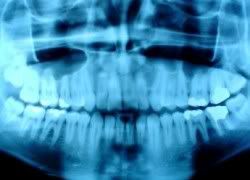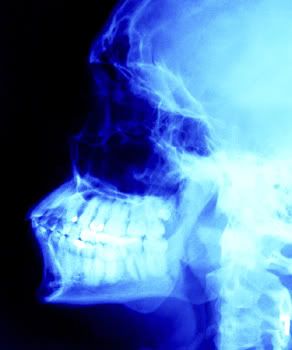Please continue reading...
Dr. Mohammed Al-Samnak, a radiology doctor situated in Kuwait, recently refused on his interview in Kuwait Times that dental x-rays it not related to thyroid cancer. “[The] dental x-ray procedure is very selective or specific. Is a doctor advised only one tooth for an x-ray, our x-ray machine would select only one tooth. It’s not connected to the thyroid, not at all,” Dr. Samnak added.
He stated this due to a new study conducted in Kuwait by scientists from Britain discovered that the exposure to dental x-rays and thyroid cancer is somehow related. Based on this study, patients who were exposed to dental x-rays are ten times more possible to develop thyroid cancer, but this was countered by Samnak. He affirmed confidently that the findings of the study were speculative and unproven.
In performing a dental x-ray procedure at any dental clinic in Kuwait, a neck shield is required to use to keep the patient’s thyroid from being exposed to radiation.
Dr. Samnak even told that thyroid cannot possibly acquire thyroid cancer for one or two accidental x-ray exposure. Even though Samnak admittedly stated that thyroid is one of the very sensitive organs in the human’s body, he said that this won’t be a problem due to a neck protection is used during the procedure.
Samnak’s statement was supported by another dentist from Kuwait, Dr Chi Umandap. Dr. Umandap is connected to the office of the assistant undersecretary at the Ministry of Health. According to Umandap, they have used X-ray to pregnant women, when it is for emergency purpose only, and it show no signs of harm done to the baby of the mother.
“Take note though that a pregnant woman should not be exposed to an x-ray, especially during the first three months. In a dental procedure we allow x-rays because they are very safe. Also, radiation dosage is minimal compared to other types of body x-rays,” Dr. Umandap added.
Umandap even explained that a normal x-ray is different to a dental x-ray. In dental-xray, they only used a small dosage of radiation due to only an alveolar bone and tissue cover the teeath.
In contrast to this matter, another doctor, who spoke with Kuwait Times. He countered Dr. Samnak and Dr. Umandap’s ideas. According to this doctor, the findings of this study may possibly accurate. The reason for this is that the dental procedures in Kuwait are very specific, even for a simple tooth ache.
In Kuwait, once a patient complains a dental problem, they will automatically undergo an x-ray, in fact, even schools do such practice. Example, when a tooth is x-rayed first. Then after its removal, another x-ray is advised. Obviously, the patient will be too much exposed to radiation.
The same doctor also stated that in other countries they check the teeth’s condition first before advising them to undergo in an x-ray, if it is necessary. They will ask first the patient’s history then decided whether an x-ray is required or not. Dental x-rays is only done for major orthodontic-cases, the doctor added. Simple dental problem will never require an X-ray.
However, the doctor pointed out that even though government clinics recommend x-ray even for simple tooth ache, repetitive X-raying is never followed by private dental clinics in Kuwait.
Here's another one, I found this in this weblink, written by Mary Shomon... Please continue reading....
Thyroid Cancer Risk May Increase Due to Multiple Dental X-Rays
According to research conducted by UK and Kuwaiti investigators, and recently reported on in the journal Acta Oncologica, the risk of thyroid cancer increases with multiple exposure to dental x-rays.
The thyroid gland is sensitive to radiation, and radiation exposure is a known cause of thyroid cancer. But dental x-rays have long been overlooked as a source of radiation, given the low dose of the radiation used.
Repeated exposure, however, now appears to be correlated to an increased risk of thyroid cancer, and according to the researchers, their findings correlate to previous research that has found an increased risk of thyroid cancer in dentists, dental assistants, and x-ray workers.
The researchers found that study subjects who had up to four dental X-rays had more than double the risk of developing thyroid cancer than those who had never had a dental x-ray. Those who had between five and nine X-rays had a risk more than four times normal. And the greatest risk was for those with ten or more X-rays, whose risk was more than five times that of someone who had not received dental x-rays.
Lead investigator Dr. Anjum Memon has said that the implications of the findings are especially important, given the increased rate of thyroid cancer in the past 30 years. In the US, for example, thyroid cancer is the fastest growing form of cancer, and in the United Kingdom, the thyroid cancer rate has doubled from 1.4 per 100,000 in 1975, to 2.9 per 100,000 in 2006.
The researchers are cautioning, however, that the topic requires further research and study, especially to get a better estimate of the radiation doses and number of exposures that are more associated with an increased risk.
What Can You Do?
Given this new information, what should you do to help protect yourself against thyroid cancer?
According to the study author Dr. Memon: "Our study highlights the concern that, like chest or other upper body X-rays, dental X-rays should be prescribed when the patient has a specific clinical need, and not as part of routine check-up or when registering with a dentist. 'So, one of the first things you can do is to make sure that you get dental x-rays only when your dentist has a specific need for them, and not just as a routine part of treatment, i.e., routine annual x-rays, or a routine dental x-ray with every checkup.
Second, and this is a recommendation that I've been making for years here at the site and in my books: Ask the dentist to protect you with a lead thyroid collar when doing any x-rays. This is a recommendation that you'll also hear from About.com's guide to Dentistry, Shawn Watson, who says: "Before you have x-rays taken at your dental office, make sure the protective lead vest, that is placed over your body prior to taking an x-ray, has a thyroid collar." (My own dentist didn't even have a thyroid collar for the longest time. He used to look at me a bit strangely when I would ask that he protect my thyroid for dental x-rays. I would end up pulling the lead apron up so that it would go right up to my chin. Now he has an actual thyroid shield on his lead apron, thankfully!)
Third, if you have young children, minimize their exposure to any unnecessary dental x-rays, and insist that their dentists and orthodontists also use a thyroid collar. Children are especially susceptible to thyroid-damaging radiation, so you'll want to ensure they are not subjected to routine or unneeded dental x-rays. And for children, any essential x-rays should only be conducted with use of the appropriate lead thyroid collar.
I think majority of the dentist did know what are the effects of Dental Xrays if done with too much exposure. In case of ignorance, any dental patient should be aware of some consequences. Dental xrays is good so that the dentist can perform or plan whatever is necessary prior doing any procedure. I believe Dental Xrays are not invented to create such disease but precaution must be undertaken to avoid it.
Source: http://whatisthetrend.net



No comments:
Post a Comment